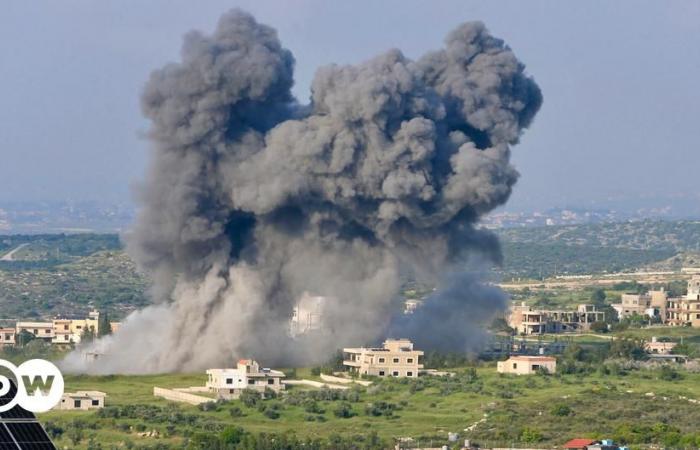When the latest round of fighting between Israel and the Lebanese militant group Hezbollah began, Lebanese Malak Daher expected it to last only a few days.
“It’s very hard to be so far from your life,” says this 30-year-old woman, displaced from the southern city of Meiss El Jabal, located almost directly on the border between Lebanon and Israel, where the fighting is centered. “You feel like your life is on hold. As if life goes on somewhere else, but your own time has stopped.”
But the fighting between Hezbollah – the Lebanese Shiite group that several countries, including the United States and Germany, have classified as a terrorist organization – and the Israeli armed forces have not ended. In fact, in recent weeks they seem to have worsened.
Daher survived the 2006 war between Israel and Hezbollah in southern Lebanon, but says it was nothing compared to the current exchange of aggression.
In early June, human rights groups reported that Israel had fired white phosphorus munitions on Lebanese cities, a violation of international humanitarian law. Meanwhile, Hezbollah has launched more than 160 rockets into Israel in retaliation for the Israeli assassination of two of its commanders.
Since the Hamas-led attack on southern Israel on October 7, 2023, which killed around 1,200 people, the situation on the Israel-Lebanon border has become increasingly tense.
The European Union, the US, Germany and other countries classify Hamas, which rules Gaza, as a terrorist group. Hezbollah, a powerful Lebanese group that plays a dominant role in Lebanese political and social life, considers Hamas an ally, while explicitly opposing Israel.
After two inconclusive wars, one in 1996 and another in 2006, Israeli forces and Hezbollah have preferred to attack each other in their territories, without a large number of victims.
Fear of war in Lebanon
However, since October 7, these types of attacks have spread from both sides, both in size and scope.
This has raised fears that unrest at the border could escalate into a full-scale war. Several Israeli politicians of a more extremist stripe have already publicly stated that Israel should attack Hezbollah now, given the tensions on the border. On the other hand, a recent popular poll indicated that the majority of Israeli citizens, more than 60 percent, currently agree with this position.
“The attacks of October 7 dramatically increased Israeli insecurity,” says a report from the Center for Strategic and International Studies, a think tank based in Washington, published in March. “If Hamas, less armed and trained than Hezbollah, can brutally kill more than 1,100 Israelis, what could the more capable Hezbollah do?”
It is unclear whether a more widespread war will break out. Current international diplomatic efforts are dedicated to preventing this, and most experts maintain that it would be strategically unwise for Israel to open another front while continuing its military operations in Gaza. They also point out that Hezbollah is a much better armed and more powerful adversary than Hamas in Gaza.
As for Lebanon, the country has been mired in an economic and political crisis for years. Even if the population sympathizes with the Palestinians – more than 37,000 of whom have died in Gaza in the last eight months – the Lebanese – struggling with inflation, unemployment and political uncertainty – are unlikely to support Hezbollah dragging them down. towards war.
Lebanese authorities say that since October 2023, there have been more than 375 fatalities in Lebanon, 88 of them civilians, as a result of Israeli attacks. On the part of the Israeli Army, 18 soldiers and 10 civilians have been killed by Hezbollah fire.
Tens of thousands of internally displaced people
Meanwhile, tens of thousands of civilians – some 100,000 Lebanese and more than 60,000 Israelis – living on both sides of the border have been displaced by the fighting.
Locals tell DW that those who left southern Lebanon are reluctant to return unless absolutely necessary. Some returned to check on their property when things seemed calmer, or, for example, to attend a funeral. However, most stores and supermarkets in the area remain closed and it is difficult to find supplies, they say.
When Daher first fled to Beirut after the start of border skirmishes in late 2023, this registered nurse was unemployed. So she decided to go back to work at a hospital in the southeast of Bint Jbeil, also near the Lebanese border with Israel. She now stays there for three days, she does her shifts and then returns to Beirut, where she and her mother stay with relatives.
At one point, Daher, who desperately wanted to return to Meiss El Jabal, said she and her 60-year-old mother – who used to make a living growing olives and tobacco in the border town – decided to travel back. But it was a nightmare, Daher told DW. With the missiles coming and going throughout the night, the only thing they could do was hide until morning.
“They haven’t just taken my time,” Daher says of the Israeli military. “I have been robbed of my ambitions and my peace. I have become an angry, anxious woman waiting for help. Before this, I was an independent woman.”
Some Lebanese refuse to leave their homes
A handful of people in southern Lebanon have refused to leave, despite continued fighting and the growing threat of war. An example is Issam Alawieh, 44 years old and father of seven children. He has stayed in his house in the border town of Maroun el-Ras along with his wife and two of his children. The family has so far survived three Israeli airstrikes.
“You can only hear the roar. It’s as if a volcano came out from under you,” Alawieh, who lost his hearing for a week after one of the attacks, told DW.
Alawieh has continued working at a bakery in nearby Bint Jbeil. “Although income is not good and sales have decreased [en] 95 percent, I have to continue feeding my children,” he says.
Living in such dangerous conditions is better than being displaced and forced to accept help elsewhere, Alawieh argues. Neighbors who fled the city called him crazy, he says, but he believes his family has adapted: the children have become accustomed to the sound of the bombing.
“If I go and leave everything here, they will humiliate me, and I don’t want that,” he explains. But there is something else, he adds: this is his home. “I can’t live far from southern Lebanon. This land is like my mother,” she emphasizes. “I cannot survive without it, and we will win as long as we stand firm on our land.”
(aa/ms)






